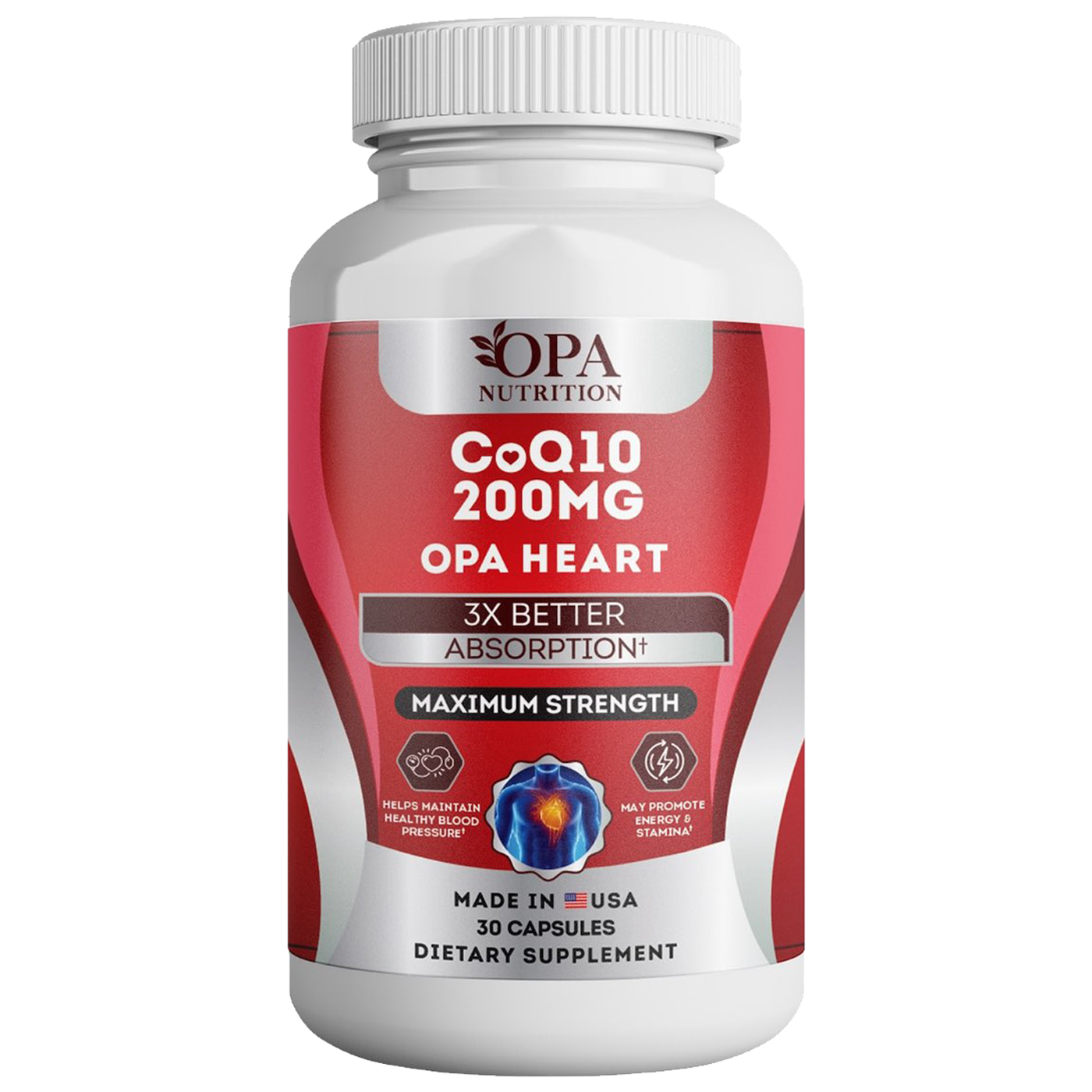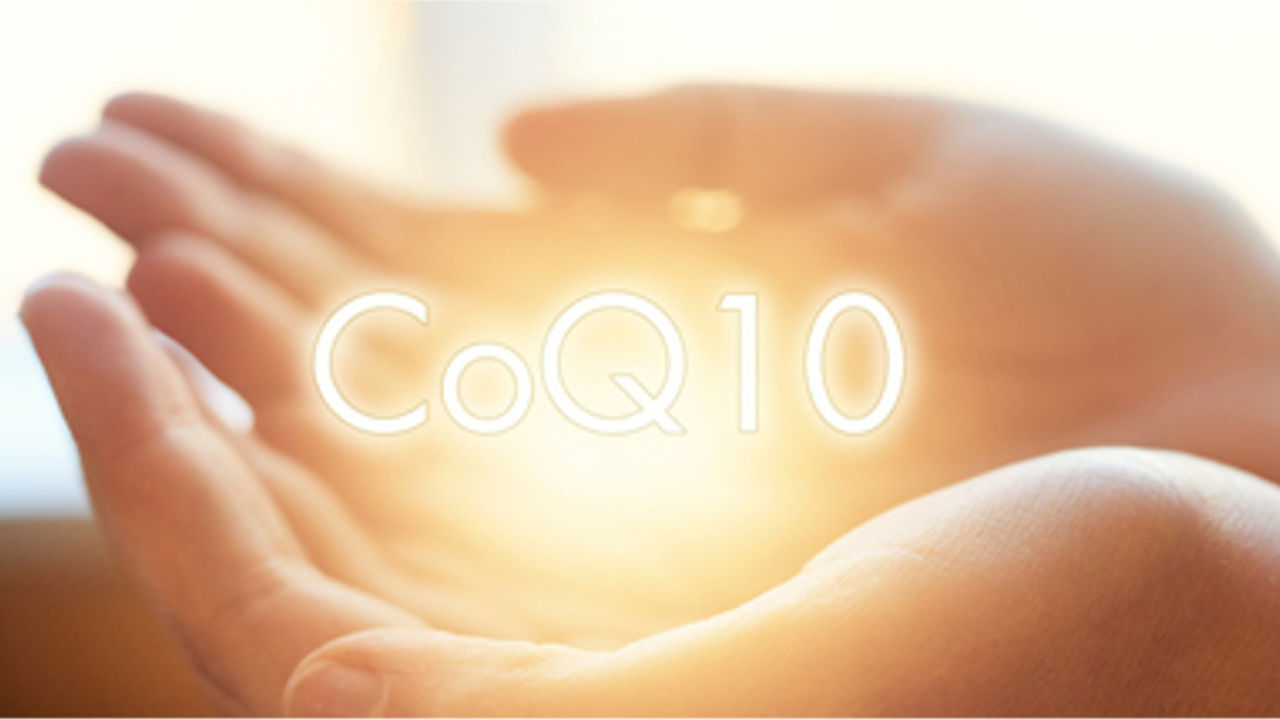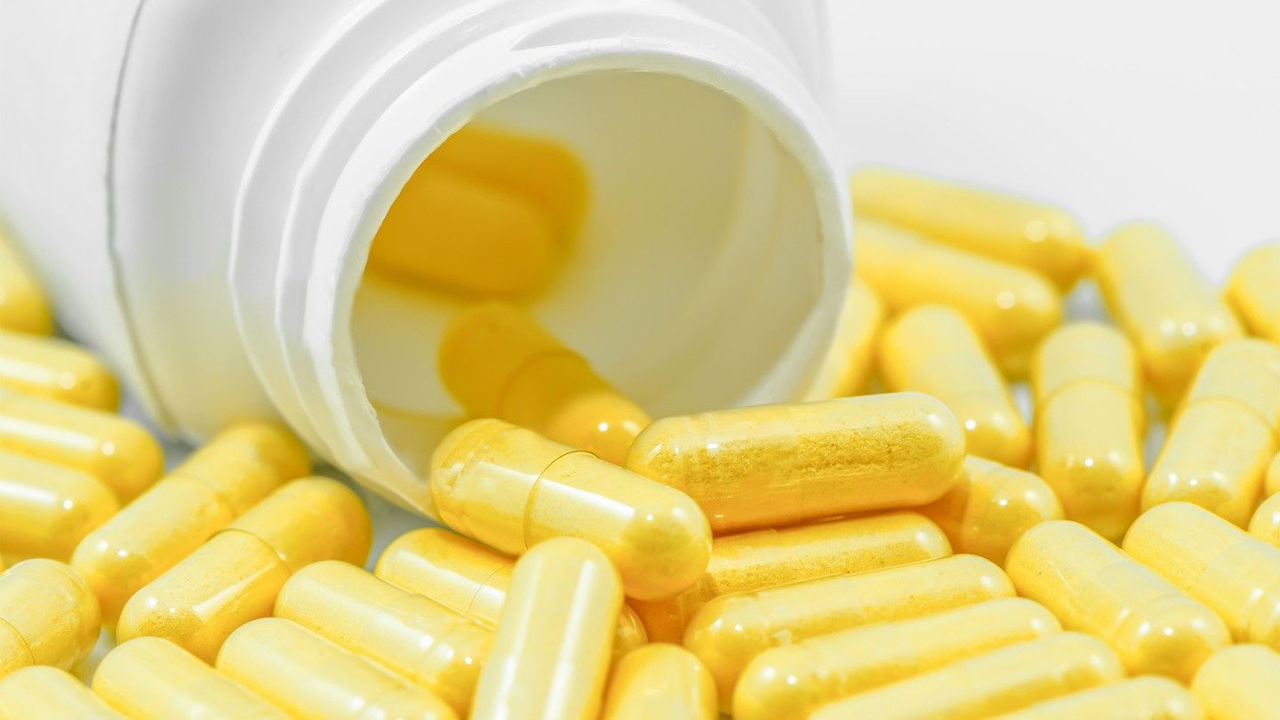"CoQ10 and Cardiovascular Health" This review article looks at the accumulating literature on the potential benefits of CoQ10 in maintaining cardiovascular health. We will explore evidence-based connections between CoQ10 and improvements in conditions like high blood pressure, cholesterol levels, heart failure, angina, and many more. The powerful antioxidant effects of CoQ10 are appealing for people looking to improve their overall health through heart health supplements.

OPA Heart
The #1 CoQ10 for Heart Health
What is CoQ10?

CoQ10, also known as coenzyme Q10, is a naturally occurring antioxidant that the body produces and can be found in almost every cell. It's essential for growth and maintenance of cells, converting food into energy - making it an important nutrient for the body. To understand its beneficial effects on cardiovascular health, we must first look at CoQ10's functions and sources. Studies have shown that CoQ10 has positive impacts on coronary artery disease, congestive heart failure, diastolic dysfunction, myocardial infarction and more. Its role in the electron transport chain helps generate energy within cells while also providing antioxidant properties to protect them from reactive oxygen species damage. Additionally, CoQ10 recycles antioxidants such as vitamin C or E plus has anti-inflammatory properties which improve endothelial dysfunction and exercise capacity too! Now you know what CoQ10 is all about - let's dive deeper into its definition, sources & functions!
Definition
CoQ10 is a naturally occurring antioxidant, produced by the body and found in almost every cell. Ubiquinone and ubiquinol are its two forms. It's better known as ubiquinol in its reduced state, or ubiquinone when oxidized. Recent studies have also identified a partially reduced form of CoQ10 - it's a quinone molecule structurally similar to vitamin K.
This fat-soluble molecule is involved in energy production and has antioxidant properties; it helps generate energy within cells, protecting them from oxidative damage while regulating mitochondrial permeability transition pores and modulating cell growth. In this section we've looked at what CoQ10 is, plus its various forms.
Sources
CoQ10 is an essential nutrient for the body, and understanding its sources is critical to comprehending its advantages. Salmon, tuna, liver, red meat, poultry, fish, nuts, seeds and whole grains are all food sources of CoQ10. You can also purchase it in supplement form from supermarkets, pharmacies or health food stores - or even online!
The amount of CoQ10 present in food fluctuates significantly; studies have revealed that the average plasma concentration of CoQ10 in a U.S. population ranges from 0.50 to 1.91 mol/l with sex and racial differences observed too. 100 mg of solubilized CoQ10 per tablet costs between $0.13-$0.33 (USD).
The organs with the highest concentration of this nutrient are heart (114 g/g), kidneys (66.5 g/g), liver (55 g/g), muscles and brain - but most comes from our diet with only a small portion produced endogenously within mitochondrial inner membranes as well! So there's plenty of options available for those looking to add this important nutrient into their diets!
Functions
CoQ10 plays a major role in strengthening the immune system, creating energy within cells, acting as an antioxidant and shielding cells from harm. It's involved in the electron transport chain and helps turn food into energy. CoQ10 also assists with regulating mitochondrial permeability transition pores and modulating cell growth. Additionally, it recycles antioxidants such as vitamin C or E, plus has anti-inflammatory properties.
Research on CoQ10 has been conducted using both animal and human models - showing positive effects for a range of cardiovascular diseases including coronary artery disease, congestive heart failure, diastolic dysfunction and myocardial infarction. Studies have revealed that CoQ10 can enhance endothelial dysfunction and exercise capacity too. Systematic reviews of clinical evidence suggest its potential to improve cardiac function while reducing the risk of adverse events related to heart disease.
Finally, CoQ10 is essential for producing pyrimidine nucleotides because it acts as a vital co-factor for DHODH; stabilizing myocardial calcium-dependent ion channels which prevents the depletion of metabolites needed for ATP synthesis. In this section, we've looked at the functions of CoQ10 plus its role in cardiovascular health.
How Does CoQ10 Affect Cardiovascular Health?

CoQ10, also known as coenzyme Q10, is an antioxidant that has been studied for its potential to improve cardiovascular health. Research suggests it may reduce the risk of coronary artery disease, major adverse cardiovascular events, and mortality related to heart issues. It also lowers reactive oxygen species associated with cardiovascular disease and blood pressure while improving exercise capacity. All in all, CoQ10 appears to be a promising supplement for those with heart conditions - but always consult your healthcare provider before taking it!
CoQ10 and Cardiovascular Health: Heart Failure
CoQ10, also known as coenzyme Q10, is a naturally occurring antioxidant that has been studied for its potential to improve heart health. Studies have revealed that CoQ10 may reduce the risk of coronary artery disease, major adverse cardiovascular events, and cardiovascular mortality. It also reduces levels of reactive oxygen species associated with the pathology of cardiovascular disease.
A placebo-controlled trial found CoQ10 supplementation was linked to a 15% reduction in major adverse cardiovascular events compared to 26% in the control group. Additionally, it decreased systolic blood pressure, left ventricular dysfunction, and diastolic dysfunction.
A systematic review showed CoQ10 supplementation improved left ventricular function, and exercise capacity and significantly reduced cardiovascular mortality. Overall, CoQ10 appears an effective adjunctive therapeutic option for patients with heart failure - reducing hospitalizations; improving NYHA classification; and decreasing cardiovascular mortality.
Statin-Associated Muscle Symptoms
CoQ10 supplementation has been studied as a potential treatment for statin-associated muscle symptoms - myalgia, weakness or fatigue thought to be caused by the inhibition of CoQ10 synthesis during statin therapy. A systematic review revealed that taking CoQ10 could significantly reduce these symptoms in patients on statins. It also showed that it could improve atrial fibrillation, diastolic function and exercise capacity.
Moreover, CoQ10 may help lower the risk of cardiovascular disease and reactive oxygen species levels associated with its pathology. The evidence suggests that supplementing with CoQ10 is beneficial for treating statin-related muscle issues - but one should be aware of any side effects or interactions before taking it.
Statin-Associated Cardiomyopathy
CoQ10 supplementation may be a successful treatment for some patients with statin-induced muscle symptoms, including cardiomyopathy. A systematic review of clinical trials revealed that CoQ10 supplementation was linked to a noteworthy decrease in major adverse cardiovascular events in people with ischemic heart disease. Moreover, CoQ10 supplementation was associated with a reduction in the incidence of acute pulmonary oedema, cardiac asthma and arrhythmia.
The evidence suggests that CoQ10 supplementation could be advantageous in reducing myocardial damage after myocardial infarction and decreasing the risk of cardiovascular disease. Additionally, it may have beneficial effects on endothelial function and help reduce levels of reactive oxygen species which are connected to the pathology of cardiovascular disease.
It's essential to consider any potential side effects or interactions when taking CoQ10 - as discussed further below - so consulting a healthcare professional is recommended to determine an appropriate dose; higher doses have been related to adverse events. Furthermore, monitoring serum levels regularly is important since values above 2 mg/L have been correlated with reasonable clinical benefits.
What Are the Benefits of Taking CoQ10?

CoQ10, or coenzyme Q10, is a powerful antioxidant that has been studied for its potential to reduce the risk of statin-associated cardiomyopathy. Let's explore the advantages of taking CoQ10 - it acts as an antioxidant, shielding cells from damage and free radicals. Studies have linked taking CoQ10 with various benefits such as improved heart function, decreased risk of heart disease and alleviated symptoms of congestive heart failure.
Moreover, research suggests that CoQ10 may boost energy production in cells, prevent blood clots and lower insulin resistance in people with diabetes. To make sure you get the most out of its potential benefits, consult your doctor about the recommended dosage of CoQ10.
Improving Heart Function
CoQ10 has been revealed to be a major boon for those with cardiovascular disease, including enhancing heart performance. Clinical trials have proven that CoQ10 supplementation can boost ejection fraction - an indicator of how efficiently the heart pumps blood. Moreover, CoQ10 has been observed to reduce blood pressure and decrease the danger of serious adverse events in people with coronary artery disease. Additionally, studies have found that CoQ10 can improve symptoms of congestive heart failure as measured by the New York Heart Association (NYHA) functional class.
CoQ10 has also been seen to raise low-density lipoprotein (LDL) levels - a type of cholesterol - which could potentially cut down on the risk of cardiovascular and metabolic diseases such as stroke, heart attack and diabetes. Furthermore, clinical studies have demonstrated that CoQ10 may lower the chance of death from congestive heart failure. The effect of CoQ10 on cardiac function has been extensively studied in both animal models and clinical trials alike.
The maximum safe dosage level (MOSL) for taking CoQ10 is 1200 mg/d; doses up to 200 mg daily have already been used in clinical tests. It's important to discuss potential risks and benefits with your doctor before beginning any kind of supplementation regimen involving this substance.
Reducing Risk of Heart Disease
CoQ10 has been proven to provide major advantages for those with cardiovascular disease, such as decreasing the chance of a second heart attack, improving symptoms of congestive heart failure and lowering blood pressure. Human studies have also revealed that CoQ10 can reduce LDL cholesterol levels, which may decrease the risk of both cardiovascular and metabolic diseases.
Moreover, CoQ10 could potentially lower the danger of death from congestive heart failure by increasing energy production in cells. It is available in various forms including tablets, powder-filled capsules and oil suspensions in soft gel capsules.
Before taking CoQ10 to reduce the risk of heart disease, it is essential to consult a doctor about any potential side effects or interactions.
What Is the Recommended Dosage of CoQ10?

The recommended dosage of CoQ10 is a key factor to consider when aiming to improve cardiovascular health. According to, adults typically need between 30 and 200 milligrams per day, although some conditions may require higher doses. It's essential to take into account the individual’s age, health status and any medications they may be taking before starting supplementation. For instance, people taking statin drugs might need more CoQ10 due to potential side effects associated with the drug.
Be sure to follow instructions on the bottle or get advice from a doctor or dietitian for best results. Too much CoQ10 can cause an upset stomach, nausea, vomiting, headache and dizziness. Additionally, it can interact with blood thinners, diabetes medication and other drugs - so consulting a doctor beforehand is important.
Taking the right dose of CoQ10 can help boost heart health and reduce risk of heart disease significantly!
Are There Any Side Effects or Interactions to Be Aware Of?
When considering taking CoQ10, it's essential to be aware of the potential side effects and interactions. This supplement may interact with blood-thinning medications, potentially decreasing their effectiveness. Additionally, adverse effects such as abdominal discomfort, headache, nausea, vomiting and allergic maculopapular rash have been associated with CoQ10. It can also reduce the effectiveness of warfarin and limit or prevent effective anticoagulation. Taking this supplement may increase the risk of coronary artery disease, congestive heart failure, myocardial infarction and decreased exercise capacity and ejection fraction too.
However, most evidence suggests that CoQ10 is safe to take - apart from occasional stomach upset - so it's important to consult a healthcare provider before taking it for assurance that it won't cause any harm. Ultimately, while being mindful of potential side effects and interactions is key when considering taking CoQ10, speaking with a healthcare provider beforehand should ensure its safety for you personally.
Summary
In summary, CoQ10 is a naturally occurring antioxidant found in most cells and organs of the body. It has various benefits on cardiovascular health, such as reducing the risk of coronary artery disease, improving left ventricular ejection fraction, reducing cardiovascular mortality, lowering blood pressure, preventing blood clots, and reducing insulin resistance in those with diabetes.
Studies have also suggested that CoQ10 supplementation may help reduce the risk of statin-associated muscle symptom and cardiomyopathy. The recommended dosage for adults is between 30-200 milligrams per day and it is important to consult a healthcare professional before taking this supplement.
Additionally, potential side effects or interactions should be discussed with a doctor before using CoQ10. Overall, CoQ10 has been found to be beneficial for heart health and its supplementation could be an effective way to improve and sustain cardiovascular health.
Frequently Asked Questions
Cardiologists recommend CoQ10 as it helps reduce oxidative stress in the body, supports normal cardiovascular function and aids the production of energy in the heart muscle. It has also been found to help lower cholesterol and other fats in the blood and can improve overall cardiovascular health.
Its antioxidant effects are shown to support healthy blood pressure and provide protection for the arteries.
Yes, CoQ10 is good for your heart. Research suggests that it may help improve symptoms of congestive heart failure and reduce blood pressure, and when combined with other nutrients it could aid in recovery from bypass and heart valve surgeries.
It has also been shown to lower the risk of a second heart attack and reduce the side effects of statin drugs.
Although taking CoQ10 is generally considered safe for most people, it may interact with certain medications and those with kidney disease should consult a doctor before using this supplement.
Therefore, there is a potential downside to taking CoQ10.
Based on the research available, CoQ10 seems to be a beneficial supplement for those with clogged arteries, as it may help to improve blood flow and reduce further damage to the cell walls.
Taking a CoQ10 supplement may prove beneficial in maintaining artery health.
Based on the scientific evidence, CoQ10 appears to reduce plaque buildup in arteries; it has been noted to reduce cholesterol-related plaque in the arteries, protect blood vessels, reduce oxidative stress and hypertension, and improve endothelial dysfunction.
Therefore, CoQ10 appears to be an effective supplement in reducing plaque buildup in arteries.



